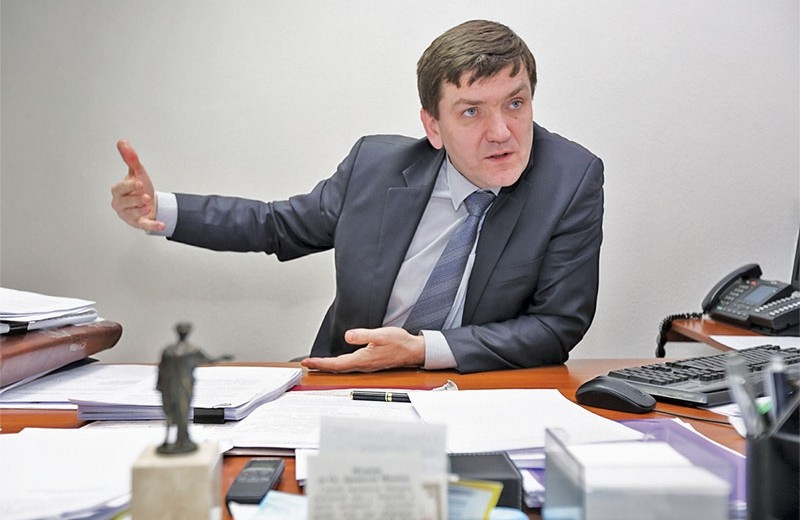The in absentia cases department of the Prosecutor General’s Office, which investigates murders of the participants of the 2013-2014 EuroMaidan Revolution and other EuroMaidan cases, will be liquidated, the department head Sergii Gorbatuk told the Kyiv Post on June 23.
Gorbatuk, who is known to be an outspoken prosecutor, attributed the liquidation to his criticism of the authorities’ alleged shady dealings with ex-President Viktor Yanukovych’s associates. Some opposition lawmakers and anti-graft activists back him in that opinion.
The Prosecutor General’s Office confirmed the department will be liquidated but denied the accusations of doing it as retribution. Instead, the office said the restructuring was in line with the concept of separating investigative and prosecution functions.
Gorbatuk said he learned about it from Deputy Prosecutor General Anzhela Stryzhevska.
“She said that the decision had been made, although the document (on liquidation) had not been signed yet,” Gorbatuk said. “She said the prosecutors and investigators would be transferred to other units.”
The prosecution unit of Gorbatuk’s department will be merged into Deputy Prosecutor General Yuriy Stolyarchuk’s department, while the investigative unit will be merged into the main investigative department, Gorbatuk said. He added that Stryzhevska would oversee both units.
“They (the leadership of the Prosecutor General’s Office) have become sick and tired of us because we’re not allowing them to reach political bargains in our cases,” Gorbatuk said.
The liquidation of the department will also further obstruct EuroMaidan cases because there will be no single center to coordinate them and more political influence on prosecutors and investigators, Vitaly Tytych, a lawyer for the families of slain EuroMaidan protesters, told the Kyiv Post.
Gorbatuk’s unit was set up in 2014 with civil society’s support to make sure that the crucial EuroMaidan cases are investigated.
Why reorganizing
Explaining the decision, Prosecutor General Yuriy Lutsenko said on Facebook on June 23 that investigators and prosecutors should not be subordinated to one boss.
“The investigators and prosecutors must be separated, according to the amendments to the law on the prosecution office,” he said.
Lutsenko also said that the same legislation envisions the transfer of the cases to the State Investigation Bureau, which has yet to be created and must take all investigative functions away from the Prosecutor General’s Office. However, Gorbatuk’s unit kept investigative functions under the law until the bureau is launched.
Lutsenko added that “not a single investigator or prosecutor in the EuroMaidan cases is being replaced or fired.”
Gorbatuk’s recent criticism
The liquidation of Gorbatuk’s department comes days after Gorbatuk and one of his subordinates, Andriy Radionov, said that Stryzhevska and another deputy prosecutor general, Eugene Enin, had no right to negotiate with fugitive ex-President Viktor Yanukovych’s Energy Minister Eduard Stavytsky. They said that Enin and Stryzhevska had no procedural status in the Stavytsky case, which was overseen by Radionov.
Enin denied any links between these events.
“I don’t comment on nonsense,” Enin said. “There are functions stipulated by the law, and there are political games.”
The version of Radionov and Gorbatuk contradicts the official version of events earlier given by the Prosecutor General’s Office, which denied accusations of wrongdoing and claimed that the negotiations with Stavytsky had complied with the law.
Enin and Stryzhevska met with Stavytsky in 2016 in a hotel in Tel Aviv in Israel to negotiate the charges against him, according to an audio recording of the meeting leaked to Slidstvo.Info and published on June 9. The recording implies that the investigators could have conspired with the ex-minister, who has been wanted for embezzlement since 2014, in a backroom deal to soften the charges against him.
The journalists also released another tape – an audio recording of a call between a man sounding like Stavytsky and an unidentified mediator, whom he refers to as “Kolya.” They discuss the future meeting with Stryzhevska, and “Kolya” says he will bring and offer her “200” – presumably a bribe of $200,000. The man who sounds like Stavytsky approves the plan.
Whistleblower prosecutor’s track record
Gorbatuk has acquired the reputation of an outspoken prosecutor and whistleblower.
Last year he directly accused President Petro Poroshenko, Interior Minister Arsen Avakov, State Security Service Chief Vasyl Hrytsak and Lutsenko of obstructing EuroMaidan cases. They deny the accusations.
Gorbatuk said in November the EuroMaidan investigations had effectively stopped because, under the law, all investigations were to be transferred by the Prosecutor General’s Office to the State Investigation Bureau.
However, the bureau has not been created yet, and the Verkhovna Rada failed to adopt legislation to extend the Nov. 20 deadline.
In 2016 Lutsenko transferred most Yanukovych-era graft cases from Gorbatuk’s department to the newly-created department for investigating organized crime. The EuroMaidan investigations remained at Gorbatuk’s unit.
“Everything the victims have achieved over the past two years is being destroyed,” the lawyers of killed EuroMaidan protesters said in a statement then. “Effectively Yuriy Lutsenko is exempting Yanukovych and other suspects from (criminal) responsibility.”
Gorbatuk also said then that “all work is being destroyed, this is a step towards the destruction of the results of our work and failure to convict the culprits.”
Lutsenko denied the allegations, accusing Gorbatuk of inefficiently investigating the cases.
Tytych told the Kyiv Post in 2016 said that the authorities had effectively destroyed Gorbatuk’s department and blocked all EuroMaidan investigations in an effort to cover up for top incumbent officials implicated in the cases. Lutsenko has denied the accusations.
“Now they have decided to destroy our main achievements,” Tytych said. “They’ll tear the cases apart and destroy them and eliminate the evidence.”



